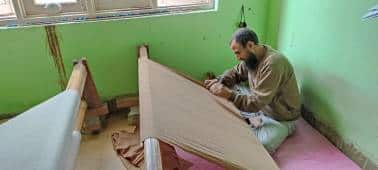



Inside a two- storied building in Nawakadal area of old city Srinagar, at least 25 artisans wait quietly, to open a bag full of Pashmina shawls.
They are purzgars, who manually remove flaws such as loose ends or knots from these exquisite shawls. These artisans are among the line of traditional craftspeople including even a warp maker or naqat and warp dresser pennakammi-gor, who are integral to the making of these geographical indicator (GI) certified, woven wool that can cost anything from Rs 50,000 and can go up to Rs 300,000.
These shawls in Nawakadal have come from a local dealer who is planning to export them to Europe before Christmas. Each artisan will be given at least five shawls, which is enough work for nearly a month, but after that work might dwindle.
Orders have been on the decline over the last few years and so have the wages. According to data shared by the Department of Handicrafts, exports of shawls from the union territory have fallen by more than 45 per cent in the last three years--from Rs 305.90 crore in 2018-19 to Rs 271.62 crore in 2019-20 and Rs 172.53 crore in 2020-21.
In this rapidly shrinking market, the artisans now have to deal with a shortage of a traditional tool called the wouch. The wouch, made of iron and resembling a large pincer, is what is used by the purzgars to weed out the imperfections.
“Our entire earning is dependent on the wouch,” says 28-year-old Aamir Nazir Wani. Over the past five years, the number of blacksmiths who can fashion this tool has dwindled.
Without it, the pashmina industry can come to a grinding halt.
 Ashiq Hussain Lone clipping out the flaws from a pashmina shawl
Ashiq Hussain Lone clipping out the flaws from a pashmina shawl
The artisans have approached the Department of Handicrafts and Handloom for help, and the director of the department has assured the artisans of a solution to the wouch shortage.
Mahmood Ahmad Shah, the department’s director, says that they are considering various options including getting a machine that can produce the traditional tool in larger numbers and asking a traditional blacksmith to train others.
Shah tells Moneycontrol that they have already approached a blacksmith. “We gave a sample and asked him to make these tools in good numbers,” he says.
Why is this tradition dying?
Wani has been working as purzgar since 2008, when he dropped out from school in Class X, to support his family of four including his father, mother and a sister. He guards his only wouch, which is losing its edge and badly needs a whetting, closely.
With the wouch, he might have to work as a daily wager like Suhail Ahmad does.
Suhail Ahmad, whose father and grandfather were purzgars, is trained in the craft. But Ahmad does not have the tool to continue in this line, and does not think the trade is financially viable anymore.
“I have seen purzgars suffering. As a daily wager, I earn Rs 700 a day,” he says. The artisans, on the other hand, have seen their earnings fall from Rs 500 to Rs 250 to Rs 300 a day.
The poor rewards are also what drove the last remaining blacksmith who can fashion a wouch to a bank job.
35-years-old Showkat Ahmad Ahanger is a generational craftsman who has worked at the smithy for 13 years. Recently, he shifted to Barzulla Bhagat in the city after getting a job at a central government owned bank.
He still has his shop but rarely attends to it. Ahanger says that he was willing to train others in the making of the tool, but no one came forward.
Why would anyone? The business is thinning.
“The purzgars are few and the new generation is not willing to learn that skill,” says Ahangar, who even asked the artisans to suggest someone he can train, but with little luck.
“I may see a rush one Sunday and then have no customers from the next,” he says.
Ashiq Hussain Lone, a purzgar who has been associated with this profession for the last 21 years, says that over 1,200 purzgars have moved on to other jobs. He estimates that now there are just 800 of the artisans left and most of them elderly.
“There are barely 15 to 20 days of work a month,” he says, adding, “during the pandemic, we spent months together without work.”
Recently, the Jammu and Kashmir administration acknowledged the indispensability of purzgars and began the process of registering the craftspeople.
These registration certificates can help the artisans avail various government schemes such as applying for financial assistance under Artisan Credit Card and the MUDRA Scheme.
Discover the latest Business News, Sensex, and Nifty updates. Obtain Personal Finance insights, tax queries, and expert opinions on Moneycontrol or download the Moneycontrol App to stay updated!
Find the best of Al News in one place, specially curated for you every weekend.
Stay on top of the latest tech trends and biggest startup news.